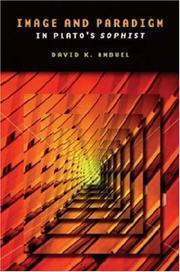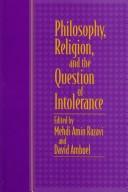| Listing 1 - 5 of 5 |
Sort by
|
Book
ISBN: 9783896656407 3896656406 Year: 2015 Publisher: Sankt Augustin : Academia Verlag,
Abstract | Keywords | Export | Availability | Bookmark
 Loading...
Loading...Choose an application
- Reference Manager
- EndNote
- RefWorks (Direct export to RefWorks)
Knowledge, Theory of. --- Théorie de la connaissance --- Plato. --- (Produktform)Hardback --- Platon --- Theaitetos --- (VLB-WN)1522: Hardcover, Softcover / Philosophie/Antike --- Théorie de la connaissance

ISBN: 9781930972049 1930972040 Year: 2007 Publisher: Las Vegas Parmenides Publishing
Abstract | Keywords | Export | Availability | Bookmark
 Loading...
Loading...Choose an application
- Reference Manager
- EndNote
- RefWorks (Direct export to RefWorks)
The 'Sophist' sets out to explain what the sophist does by defining his art. But the sophist has no art. Plato lays out a challenging puzzle in metaphysics, the nature of philosophy, and the imitation of philosophy that is unraveled in this new and unconventional interpretation. Here is a new translation of this important late Platonic dialogue, with a comprehensive commentary that reverses the dominant trends in the scholarship of the last fifty years. The 'Sophist' is shown to be not a dry exposition of doctrine, but a rich exercise in dialectic, which reveals both the Eleatic roots of Platonic metaphysics and Plato's criticism of unrevised Eleaticism as a theoretical underpinning for sophistry The 'Sophist' is presented now not as an artefact of the intellectual past or precursor of late 20th century philosophical theories, but as living philosophy. In a new translation and interpretation, this late dialogue is shown to be a defense of not a departure from Plato's metaphysics. The book is intended to provide a complete interpretation of Plato's 'Sophist' as a whole. Central to the methodology adopted is the assumption that all elements of the dialogue to be understood must be understood in the context of the dialogue as a whole and in its relation to other works in the Platonic corpus. Three main points are argued: 1) the dialogue does not present a definitive or positive doctrine of the late Plato, but has the structure of a reductio ad absurdum; 2) the figure of the sophist is employed to critically examining the metaphysics of Parmenides. While acknowledging a core of metaphysical insight in Parmenides, the argument implies that, by failing to account for resemblance, Eleaticism implies an inadequate theory of relations, which makes impossible an adequate understanding of essence. Consequently, Eleaticism unrevised can be taken as the philosophical underpinning for the antithesis of philosophy, lending legitimacy to sophistry; 3) the criticism constitutes a
Book
ISBN: 1282256114 9786612256110 1930972520 Year: 2007 Publisher: Las Vegas : Parmenides Pub.,
Abstract | Keywords | Export | Availability | Bookmark
 Loading...
Loading...Choose an application
- Reference Manager
- EndNote
- RefWorks (Direct export to RefWorks)

ISBN: 0585063443 9780585063447 0791434478 0791434486 9780791434475 9780791434482 0791494756 9780791494752 Year: 1997 Publisher: Albany, NY : State University of New York Press,
Abstract | Keywords | Export | Availability | Bookmark
 Loading...
Loading...Choose an application
- Reference Manager
- EndNote
- RefWorks (Direct export to RefWorks)
Philosophy, Religion, and the Question of Intolerance is a diverse collection of essays united by a common starting point and theme - the awareness that intolerance is a phenomenon encountered in diverse places and circumstances and often handled with limited success. The question of toleration, together with its cultural, social, religious, and philosophical implications are addressed by leading authorities who offer insights from an interdisciplinary perspective.
Toleration. --- Bigotry --- Intolerance --- Tolerance --- Virtues --- Discrimination
Digital

ISBN: 9783110287134 9783110286953 Year: 2013 Publisher: Berlin ;; Boston De Gruyter
Abstract | Keywords | Export | Availability | Bookmark
 Loading...
Loading...Choose an application
- Reference Manager
- EndNote
- RefWorks (Direct export to RefWorks)
| Listing 1 - 5 of 5 |
Sort by
|

 Search
Search Feedback
Feedback About UniCat
About UniCat  Help
Help News
News